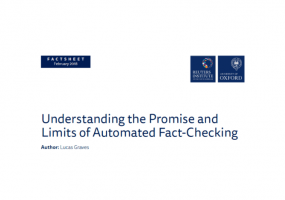Are Newspapers Heading Toward Post-Print Obscurity? A case study of The Independent’s transition to online-only
In this paper, Neil Thurman and Richard Fletcher use a case study of The Independent to explore what happens when newspaper brands stop printing and go online only. They estimate that, although its net British readership did not decline in the year after it stopped printing, the total time spent with The Independent by its British audiences fell 81%.
Abstract: With print circulations in decline and the print advertising market shrinking, newspapers in many countries are under pressure. Some—like Finland’s Taloussanomat and Canada’s La Presse—have decided to stop printing and go online-only. Others, like the Sydney Morning Herald, are debating whether to follow. Those newspapers that have made the switch often paint a rosy picture of a sustainable and profitable digital future. This study examines the reality behind the spin via a case study of The Independent, a general-interest UK national newspaper that went digital-only in March 2016. We estimate that, although its net British readership did not decline in the year after it stopped printing, the total time spent with The Independent by its British audiences fell 81%, a disparity caused by huge differences in the habits of online and print readers. This suggests that when newspapers go online-only they may move back into the black, but they also forfeit much of the attention they formerly enjoyed. Furthermore, although The Independent is serving at least 50% more overseas browsers since going online-only, the relative influence on that growth of internal organizational change and external factors—such as the “Trump Bump” in news consumption—is difficult to determine.






